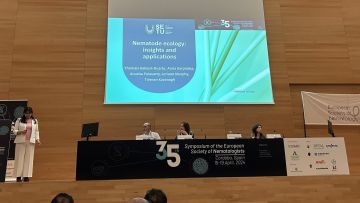Five members of the Molecular Ecology and Nematode Research Group (MENRG) from South East Technological Universitys (SETU) enviroCORE took part in the 35th Symposium of the European Society of Nematologists (ESN), in Cdoba, Spain, in April 2024.
Dr Thomaé Kakouli-Duarte, co-director of enviroCORE and SETU lecturer, was invited to present the research of MENRG at a plenary talk to the symposium audience, showcasing the group’s work entitled, “Nematode ecology: insights and applications”.
Nematodes are microscopic soil and sediment roundworms who are the most abundant animals in nature. It is estimated that there are 57 million nematodes for every one living human being. They exist in almost every habitat on earth and occupy key positions in soil and sediment food webs, feeding on and being eaten by other soil and sediment biota. Nematodes are studied at many levels and are utilised as excellent bioindicators of environmental change, having direct implications for the health of soil and sediment ecosystems.
Essential ecosystem services
Nematodes provide essential ecosystem services for the stability of human societies and civilisation. Specifically, they help with soil nutrient cycling, thus supporting to achieve food security and supply of fuel and fibre. Additionally, they provide genetic resources applicable in agriculture, environmental science, and medicine. Nematodes can help regulate diseases and pests, help with decontamination of soils and bioremediation, assist in climate and water regulation, support soil formation and organic matter transformation, and ultimately with plant growth and population regulation.
Dr Kakouli-Duarte highlighted all these marvellous nematode ecosystem services and culminated with past and current studies at SETU on nematode communities and food webs, with the aim of safeguarding soil health.
Developments in the field
SETU’s symposium engagement with peers at international level was an opportunity to present original research, update on current developments in the field, and learn from others in the area.
Speaking about the experience, Dr Kakouli-Duarte said, “It was hugely satisfying and fulfilling to present out research efforts on behalf of SETU, enviroCORE and the MENRG. I want to acknowledge the support of enviroCORE and SETU for providing fertile ground for this research. I also want to commend the excellent work of my group members, the financial support of funding bodies, especially that of Interreg-NWE for our ReNu2Cycle project, and the European Society of Nematologists for the invitation.”
Dr Kakouli-Duarte is an ESN member for almost 20 years and the society’s representative in Ireland. She has earned the appreciation of her peers through collaborative and collective work at many levels, ultimately receiving this prestigious invitation.
For more information on research at SETU, visit setu.ie
Photo caption: Dr Thomaé Kakouli-Duarte, co-director of enviroCORE and SETU lecturer, presented the research of MENRG to the symposium audience, showcasing the group’s work entitled, “Nematode ecology: insights and applications” at the 35th Symposium of the European Society of Nematologists (ESN), in Córdoba, Spain, in April 2024.


